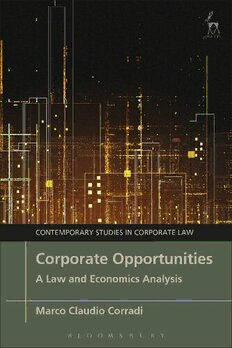
Corporate Opportunities: A Law and Economics Analysis PDF
325 Pages·2021·7.012 MB·English
Most books are stored in the elastic cloud where traffic is expensive. For this reason, we have a limit on daily download.
Preview Corporate Opportunities: A Law and Economics Analysis
Description:
Despite the many open questions on how to interpret corporate opportunity rules, their relevance for the development of a corporation in its early stages is undoubtable. The traditional economic reading of corporate opportunity doctrines has ascribed the rules to the area of economic agency theory, and has stressed their function to contain agency costs. But corporate opportunity rules are surrounded by a far more complex set of variables in highly innovative environments.On the one hand, the rules limit the mobility of corporate founders who sit on start-up boards – where founders represent the very building blocks and knowledge upon which technical innovation depends. On the other, they may limit venture capital intra-industry operativity – when the same general partner sitting on the boards of competing start-ups find themselves in a position of divided loyalty.Far from being a systematic commentary on corporate opportunity rules, this book applies the law and economics method to the corporate opportunity legal paradigm, drawing normative examples from both the common law and civil law traditions. After presenting a simplified economic model for the analysis of bargaining over corporate opportunities, it identifies common patterns in corporate opportunity rules and potential legal and/or contractual solutions for their development, either by way of court innovation or private ordering. These patterns and adaptations may prove crucial to different economic realities, such as industrial districts, venture capital and corporate venture capital.
See more
The list of books you might like
Most books are stored in the elastic cloud where traffic is expensive. For this reason, we have a limit on daily download.
